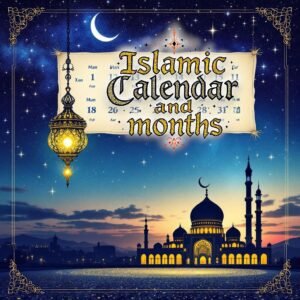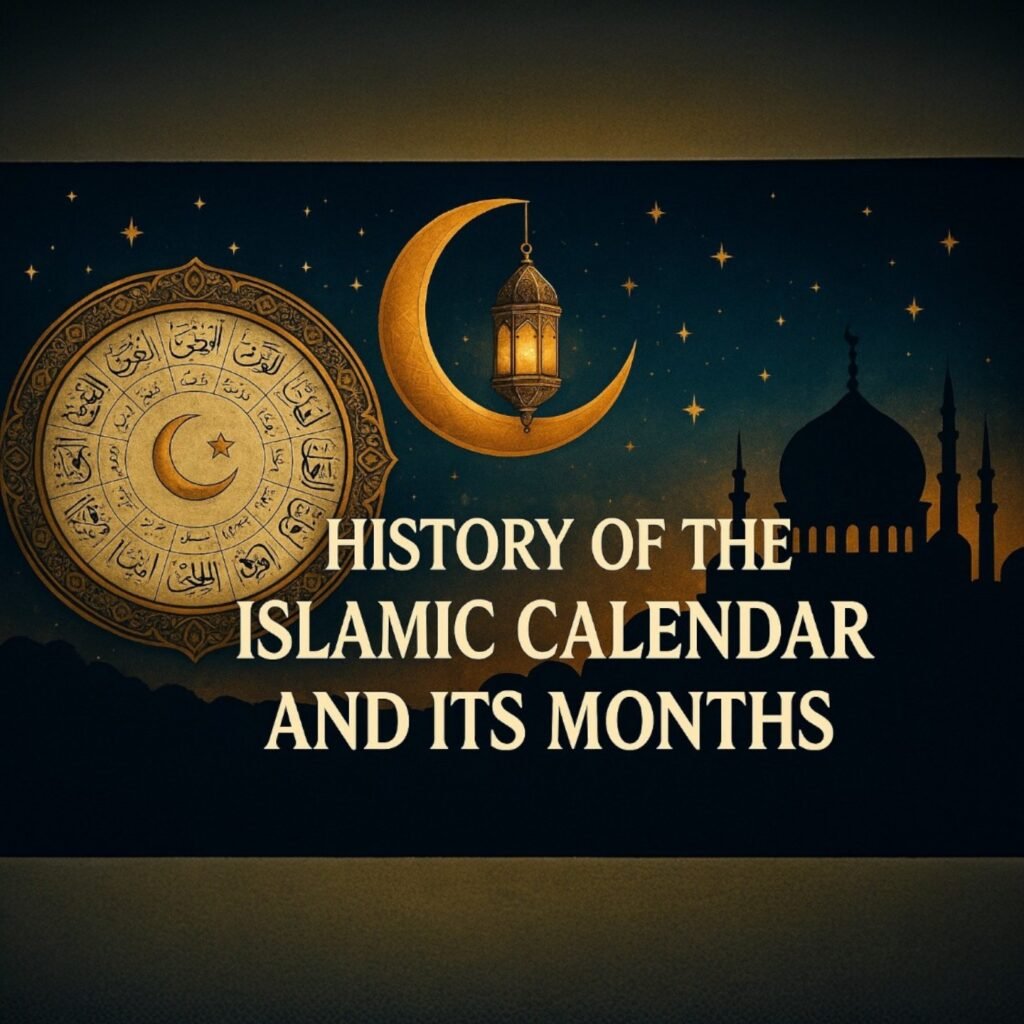History of the Islamic Calendar and Its Months: A Journey of Faith, Time, and Divine Wisdom
Table of Contents
ToggleIntroduction:
The Islamic Calendar and Its Months represents more than just dates on a calendar, but rather a world of divine history, sacred remembrance, and spiritual awakening. This lunar calendar is distinct from all other timekeeping systems devised by man, and is ingrained in the Qur’an, Sunnah, and the practices of previous righteous generations.
As a lunar calendar, it is Allah’s way of bringing earthly time into conjunction with divine blessings.
A sacred calendar serves as a point of remembrance for Muslims, a reminder of their purpose, their belief, their moments of trial, and their times of celebration. Each month from Muharram to Dhul-Hijjah has its own sense of barakah, its own lessons from the past, and its own reminder to return to Allah ﷻ.
Summary:
- The Islamic calendar is a lunar calendar with 12 months.
- It starts with the Hijrah (migration) of the Prophet Muhammad ﷺ️ from Makkah to Madinah.
- Each month has historical depth and spiritual significance.
- The Islamic Calendar and Its Months encourages reflection, patience, gratitude, and submission.
- There are many myths associated with months such as Safar that are addressed through the Qur’an and the Sunnah.
- Understanding the Islamic calendar can also help believers relate to Islamic history much more directly.
Features of the Islamic Calendar and Its Months:
Beginning of the Calendar
The initiation of the Islamic calendar happened during the caliphate of Sayyiduna Umar ibn Al-Khattab (RA) in 17 AH. Sayyiduna Umar ibn Al-Khattab (RA) picked the Hijrah (migration of the Prophet ﷺ️) as the event marking time in Islam.
“Indeed, the number of months with Allah is twelve…” (Qur’an 9:36)
Lunar System of Timekeeping
The months are based on the moon’s cycle and, therefore, Islamic events rotate through the seasons. They are a reminder to us that time is a creation of Allah.
The 12 Islamic Months
- Muharram – Month of Allah, sacred and full of reward
- Safar – Often misunderstood with myths; actually a normal month of reflection
- Rabi al-Awwal – Birth of the Prophet ﷺ️
- Rabi al-Thani
- Jumada al-Awwal
- Jumada al-Thani
- Rajab – Month of Isra’ and Mi’raj
- Sha’ban – Month of preparation for Ramadan
- Ramadan – Month of fasting and revelation
- Shawwal – Eid celebrations and renewal
- Dhul-Qi’dah – Month of peace and reflection
- Dhul-Hijjah – Sacred pilgrimage and sacrifice
Dispel the Myths Surrounding Safar
Many erroneously associate Safar with misfortune or calamity. However, the Prophet ﷺ️ narrated:
“There is no ‘Safar’ (misfortune in relation to the month of Safar).” – [Sahih Bukhari]
Spiritual Reflection/Lessons
Every month in the lunar/Hijri calendar and Islamic months presents an opportunity for tawbah (repentance), to do dhikr (remembrance), and reflect on the lives of the Prophets and pious predecessors.
Inspiration: Faith Through the Calendar
In these peaceful nights of Ramadan when Qur’an recitation echoes around the globe and in the silence of Dhul-Hijjah when millions stand at Arafah, we remind ourselves that the Islamic Calendar and its Months is Allah’s way of bringing the believers back to Him every few weeks.
There is a spiritual story about a poor child, Hamza from Syria, worth recounting. Hamza had memorized the entire Qur’an while seeking refuge in a camp. His mother would mark days of the Islamic calendar and teach him the stories behind each day which gave him hope when he was suffering.
For example, on the 10th of Muharram, she told him the story of Imam Hussain’s bravery and sacrifice, and on that day little Hamza said, “I want to grow up and serve Allah with bravery like him!”
This is what the calendar offers us — guidance, identity, and purpose.

Beliefs and Facts:
- The lunar (Hijri) calendar lasts 354 days.
- Every month begins with sighting the new moon.
- It is utilized for all aspects of Islam that include fasting, Hajj, Zakat, etc.
- It focuses on reflection – through sacred events.
- No month has superstition in Islam.
- Learn to remember the months & their place.
- Teach your children the importance of each Islamic month.
- Use this calendar to design spiritual goals.
- Plan your Islamic events according to the highlights of the month.
- Break misconceptions about the months like Safar.
- Acknowledge your Hijrah and use this to inspire your own journey.
Spiritual Stories of Sufi Saints
- During Rajab and Sha’ban, Sheikh Abdul Qadir Jilani (RH) promoted reflection and preparation for Ramadan spiritually.
- Khwaja Gharib Nawaz (RH) hosted mass Iftar and dhikr gatherings related to the months of Shawwal and Dhul-Hijjah.
- Khwaja Bandanawaz Deccan (RH) would tell new seekers the meanings of the months saying, “To understand time is to understand the Divine will.”
Conclusion:
The Islamic Calendar and Its Months is not simply about timekeeping — it’s about meaningful timekeeping. From the auspicious nights of Ramadan to the sad remembrance of Ashura, every date on the Islamic calendar has echoes from the past and keys to the future. Let’s rekindle our passion for the divine calendar and let it be our guide during every season.
“But by time, indeed, mankind is in loss, except for those who have believed and done righteous deeds” (Qur’an 103: 1-3)
Continue Your Spiritual Journey:
5 FAQs About the Islamic Calendar and Its Months
Frequently Asked Questions
1. What is the Islamic calendar based on?
2. Why does the calendar start with Hijrah?
Is Safar an unlucky month?
4. How many sacred months are there in Islam?
5. Can we use the Gregorian calendar in Islam?
- All Posts
- English Blogging

7 Heart-Melting Truths About Tears in Sujood,One Step Toward Allah That Changes Everything Introduction Tears can be shed either out...

The First Step to Allah: Take One Step Toward Allah and Watch His Mercy Run to You The authentic Hadith...

Introduction In all times, when hearts distance themselves from Allah, and faith appears to be overshadowed by worldly turmoil, Allah...
Connect with Us on the Path of Knowledge & Light
Are you ready to embark on a journey of Islamic learning and spiritual growth? Please reach out.





Mashallah Great work Good explanation superb. God bless you